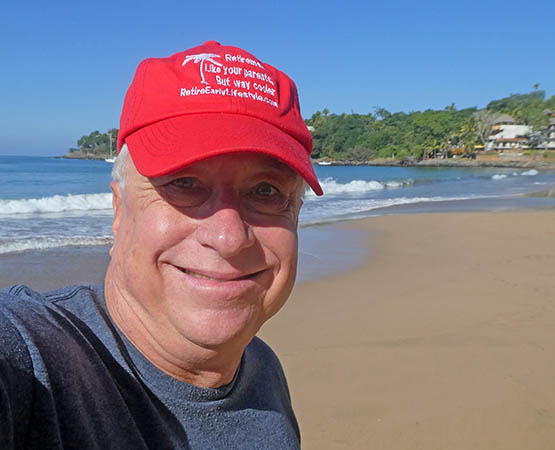|
Retire Early
Lifestyle
Retirement; like your parents, but way cooler

|
In 1991 Billy and Akaisha Kaderli retired at the age
of 38. Now, into their 4th decade of this
financially independent lifestyle, they invite you
to take advantage of their wisdom and experience. |
|
What I
learned on Wall Street
From a Reformed Broker
Billy and Akaisha Kaderli

Billy on Chacala Beach, Mexico
Everyone thinks that brokers know
how to invest.
It's why we pay them, right?
Investment houses teach their
brokers the rules of investing and the differences among stocks, bonds,
annuities, and limited partnerships. We learned the rules of option trading,
were told what an IPO is, and learned about the benefits of diversification. But
this does not mean we were taught the skill or art of investing.
Remember, Wall Street firms are
there to make money.
Serious money.
They trade their accounts just like you and
I do. Sometimes their trading desks do well, and other times not so well. But
brokerage firms always make money on the retail side from commissions, and the
firm's idea of a good broker is one who generates income for the company,
regardless of their clients' investment returns.
We
were trained how to sell, and so long as you stay within the rules, a broker's
behavior may or may not have anything to do with the client's best interest.
Lesson No. 1: Think twice before
trading.
As a branch manager, my primary job
was supervising my brokers.
I can remember many times where account executives
made more money than their clients did in a year. It was up to me to be sure they
were working within the proper regulations, both from our company and from the
Securities and Exchange Commission. Therefore, I needed to monitor my brokers'
trades, watching for excessive action in individual accounts.
At the end of the year, I would look
at the commissions generated from certain accounts versus how much money that
account increased during the past year.
Too many times I saw the broker making more
than the clients did. The trades were fine -- they weren't examples of churning,
and they were perfectly legal. Most of the time these accounts reflected
unsolicited trades. This meant that a client heard of some investment from
friends, coworkers, or the media, and then called his or her broker to place the
trade. But in the end it was the broker who made the money.
So, one lesson of
investing that I learned was not to trade, and hold steady during
market downturns.
Each time you move money, it costs
you.
This takes a toll on your portfolio's performance.
Lesson No. 2: Know what the
expense ratio is for your fund.
Then I discovered no-load mutual
funds.
Now remember, this was almost 35 years ago, and I was a loyal employee.
At the time, it was impossible for me to place my clients' money into no-load
funds. Both our computer system and our business model wouldn't allow it, and
besides, I had bills to pay, too. But the fact that these funds were available
interested me enough to do further research.
And research I did.
I tore apart their return numbers
over and over, comparing them to my firm's.
One hundred percent of the time, the
no-load funds won the competition.
This was difficult for me to accept, since I
was a company man. But I also wanted to do right by my clients. This growing
dichotomy began taking its toll on me as I realized that I was not doing what
was best for the people who trusted me. This was one of the reasons I retired.
I also determined that expenses
matter. If a broker is taking a commission on a mutual fund trade - which he is
-
that money is coming out of your investment. So keep fees to a minimum. Have
someone else pay for your broker's house. Don't let it be you.
Lesson No. 3: Invest for
the long term, and become your own expert.
Nothing can replace your personal
involvement in your financial welfare.
During my time as a branch manager, my
firm would regularly fly me to New York for education on financial products we
offered. Even though I could find air-tickets far cheaper, they insisted I use "our"
travel agency and stay in an upscale hotel at ridiculous prices. Cruises around
Manhattan and lavish dinners and wines were used as incentives, and they spoiled
us.
But where was this money coming from?
The customers' pockets.
Commissions, expenses, and trading
all have a financial impact on your portfolio. This seems simple enough, yet
many still use full service brokers and are paying the price.
I hope you're not
foolish enough to be one of them.
For more on
Retirement Topics,
click here and
here and don't forget to signup for
our free Newsletter.

About the Authors



Retire
Early Lifestyle appeals to a different
kind of person – the person who prizes their
independence, values their time, and who doesn’t
want to mindlessly follow the crowd.
HOME
Book Store
Retire Early Lifestyle Blog
About Billy & Akaisha
Kaderli
Press
Contact
20 Questions
Preferred
Links
Retirement
Country Info
Retiree
Interviews
Commentary
REL
Videos
|